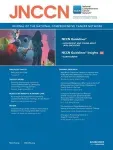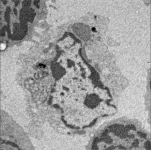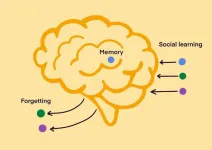(Press-News.org) PLYMOUTH MEETING, PA [August 7, 2023] — New research in the August 2023 issue of JNCCN—Journal of the National Comprehensive Cancer Network evaluates how an important analysis on local-regionally advanced colon cancer adjuvant chemotherapy impacted prescribing patterns. The IDEA collaboration included more than 12,000 patients with Stage III colon cancer across 6 randomized phase 3 trials in a planned pooled analysis, to determine how three or six months of post-surgery chemotherapy—either a combination of capecitabine/oxaliplatin (CAPOX) or fluorouracil/leucovorin/oxaliplatin (FOLFOX)—impacted outcomes.[1] The current JNCCN study revealed that after the full publication of IDEA, the percentage of patients treated with CAPOX rose from 14% to 48%. Also, 45.2% of patients were prescribed adjuvant therapy for only three months after IDEA, compared to just 5.6% before.
“Our study results showed a significant increase in planning for three months of adjuvant chemotherapy after the presentation of IDEA. We also observed that more patients were prescribed CAPOX compared to FOLFOX, which had previously been more widely used as the preferred treatment regimen of choice,” said senior author Daniel H. Ahn, DO, Mayo Clinic Comprehensive Cancer Center. “The biggest concern with six months of chemotherapy are the toxicities from treatment—including low blood counts, kidney and liver dysfunction, and peripheral neuropathy (intolerable numbness and/or weakness). Patients that receive six months of adjuvant chemotherapy are greater than five times more likely to experience grade III or higher peripheral neuropathy. Of course, with three months of chemotherapy we have to be concerned about whether the shortened duration can potentially negatively affect cancer outcomes. Given these nuances, the choice of regimen and duration remains a shared decision.”
The researchers acknowledged that the study’s time period included the COVID-19 pandemic, which may also have played a part in encouraging a shorter duration for chemotherapy.
“At the height of the COVID-19 pandemic, prescribing treatments were influenced to incorporate more oral therapies and less infusion-based visits to minimize exposure to high-risk patients,” said Dr. Ahn.
The researchers studied 399 patients who had been diagnosed with stage III colon cancer and were treated with post-surgery chemotherapy at the Mayo Clinic or Emory University Heath System on or after January 1, 2016. Their findings examined the planned type of chemotherapy and duration before the IDEA abstract was presented, after the abstract, and after the full manuscript publication. In addition to seeing a shift toward shorter adjuvant treatment durations and toward the increased use of CAPOX, the results showed that the adoption of a shorter chemotherapy period was more prevalent for Black patients.
“The IDEA collaborative analysis in stage III colon cancer showing the fairly similar disease-free and overall survival with three months of adjuvant CAPOX compared to the prior standard of six months of chemotherapy in participants with T3N1 disease felt immediately practice changing at its presentation and publication in 2017-2018, and the data was incorporated into the NCCN Guidelines for Colon Cancer shortly thereafter,” explained Katrina S. Pedersen, MD, MS, Associate Professor of Medicine, GI Medical Oncologist, Siteman Cancer Center at Barnes-Jewish Hospital and Washington University School of Medicine, who was not involved in this research. “This study provides the first long-term objective evidence that oncologists across several academic health systems agreed and rapidly shifted prescribing patterns from the majority getting FOLFOX for six months to receiving CAPOX or FOLFOX for three months.”
Dr. Pedersen, a member of the NCCN Clinical Practice Guidelines in Oncology (NCCN Guidelines®) Panel for Colon Cancer, continued: “Interestingly, the data presented raise the question of what role the COVID-19 pandemic had in accelerating the adoption of CAPOX and what motivated more rapid adoption of three-month regimens in African Americans. I would personally like to see further research to examine if community practice patterns have similarly shifted since IDEA, how prescribing changes have impacted outcomes in African Americans or in higher-risk (T4 or N2) patients, and whether our current era of significant chemotherapy supply chain restrictions have impacted treatment, to help inform future guidelines-based discussions.”
To read the entire study, visit JNCCN.org. Complimentary access to “Changes in Prescribing Patterns in Stage III Colon Cancer” is available until November 10, 2023.
JNCCN’s Growing Impact
The impact factor for JNCCN has continued to grow, hitting a new record high of 13.4, up from 12.693 last year. This index is calculated by Clarivate, based on the yearly average number of article citations published during the previous two years. With this new impact factor, JNCCN is now ranked in the top 92nd percentile.
# # #
About JNCCN—Journal of the National Comprehensive Cancer Network
More than 25,000 oncologists and other cancer care professionals across the United States read JNCCN—Journal of the National Comprehensive Cancer Network. This peer-reviewed, indexed medical journal provides the latest information about innovation in translational medicine, and scientific studies related to oncology health services research, including quality care and value, bioethics, comparative and cost effectiveness, public policy, and interventional research on supportive care and survivorship. JNCCN features updates on the NCCN Clinical Practice Guidelines in Oncology (NCCN Guidelines®), review articles elaborating on guidelines recommendations, health services research, and case reports highlighting molecular insights in patient care. JNCCN is published by Harborside/BroadcastMed. Visit JNCCN.org. To inquire if you are eligible for a FREE subscription to JNCCN, visit NCCN.org/jnccn/subscribe. Follow JNCCN on Twitter @JNCCN.
About the National Comprehensive Cancer Network
The National Comprehensive Cancer Network® (NCCN®) is a not-for-profit alliance of leading cancer centers devoted to patient care, research, and education. NCCN is dedicated to improving and facilitating quality, effective, equitable, and accessible cancer care so all patients can live better lives. The NCCN Clinical Practice Guidelines in Oncology (NCCN Guidelines®) provide transparent, evidence-based, expert consensus recommendations for cancer treatment, prevention, and supportive services; they are the recognized standard for clinical direction and policy in cancer management and the most thorough and frequently-updated clinical practice guidelines available in any area of medicine. The NCCN Guidelines for Patients® provide expert cancer treatment information to inform and empower patients and caregivers, through support from the NCCN Foundation®. NCCN also advances continuing education, global initiatives, policy, and research collaboration and publication in oncology. Visit NCCN.org for more information.
[1] N Engl J Med 2018; 378:1177-1188, DOI: 10.1056/NEJMoa1713709
END
DALLAS, August 7, 2023 — Nancy Brown, chief executive officer of the American Heart Association, has again been recognized for elite leadership in the 26th annual listing of The NonProfit Times Power & Influence Top 50. For more than three decades, The NonProfit Times has been a leading trade publication providing news, information and insight into nonprofit management.
Brown, who is now appearing for the 8th time on this list, was recognized specifically for her leadership as a champion for equitable health. The NonProfit ...
WASHINGTON, D.C. - Today, the U.S. Department of Energy (DOE) announced $4.7 million in funding for five new research projects in computational biology. These projects will develop new software and analytical tools to manage the growing quantities of genomics and other data stemming from the study of microbes and other biological systems.
“The Biological and Environmental Research (BER) Genomic Science program is at the forefront of using genome-enabled approaches to identify the basic principles that drive biological systems underlying functional processes of organisms,” said Todd Anderson, DOE Acting Associate Director for BER. “To gain ...
HOUSTON – (Aug.7, 2023) – The spinal cord is harder to access and study than even the brain. The challenges posed by its mobility and anatomical structure have made understanding exactly how it functions difficult.
Rice University engineers will work with collaborators to optimize an array of nanoelectronic threads, or NETs ⎯ already used successfully for gathering high-fidelity, long-term data from neurons in the brain ⎯ for use in the spine, supported by a $6.25 million, four-year grant from the National Institutes of Health.
In addition to neuronal activity recordings, NET probes can provide tunable, localized stimulation of adjacent neurons. Rice ...
HOUSTON, Aug. 7, 2023 – The Baker Hughes Foundation announced a $100,000 grant to the University of Houston Energy Transition Institute (ETI) to support environmental justice research and workforce development programs.
The institute, which focuses on the creation and use of reliable, affordable, environmentally responsible energy for all through a just and equity-driven pathway, is looking forward to using the grant to amplify its mission.
“Thanks to the generous support of the Baker Hughes Foundation, the UH ...
ITHACA, N.Y. – Geoscientists have long thought that water – along with shallow magma stored in Earth’s crust – drives volcanoes to erupt. Now, thanks to newly developed research tools at Cornell, scientists have learned that gaseous carbon dioxide can trigger explosive eruptions.
A new model suggests that basaltic volcanoes, typically located on the interior of tectonic plates, are fed by a deep magma within the mantle, stored about 20 to 30 kilometers below Earth’s surface.
The research, which offers a clearer picture of our planet’s deep internal dynamics and composition, with ...
Researchers at Kobe University discovered an entirely new and unexpected mechanism by which the immune system can get rid of cells lacking molecules that identify them as part of the self in mice. The finding, published in PNAS, has possible implications for cancer treatment.
The immune system comprises many types of cells that work together to fight off diseases. Two important types are dendritic cells and T cells. Dendritic cells are located in strategic positions throughout the body including the gut and skin, as well as in the lymph nodes, sample their environment and present small components derived from these samples on their ...
Social learning is typically thought to be most beneficial when the environments in which individuals live change quite slowly – they can safely learn tried and tested information from one another and it does not go out of date quickly. Innovating brand-new information, on the other hand, is thought to be useful in dynamic and rapidly changing environments.
Researchers Madeleine Ammar, Laurel Fogarty and Anne Kandler at the Max Planck Institute for Evolutionary Anthropology developed an agent-based simulation model of the evolution ...
Researchers at Uppsala university have developed a new method to find mutations in brain tumors in children. They could also show that the mutations identified by them changes how cancer cells respond to a cancer drug. These findings could lead to better diagnostics and more individualized treatment of children with brain tumors. The study is published in the journal PNAS.
Medulloblastoma is the most common malignant brain tumor in children. It usually develops in the cerebellum and even if modern treatment has improved the prognosis so that over 70% live more than five years, not all patients ...
Outbreaks of polycystic echicnococcosis, a life-threatening zoonotic disease, are driven by regional climate changes, according to a study led by the Barcelona Institute for Global Health (ISGlobal), an institution supported by “la Caixa” Foundation. The findings, published in PNAS, provide evidence of the impact of climate on neglected tropical diseases in the Amazon region, with implications for other zoonoses.
Polycystic echinococcosis (PE) is a neglected life-threatening zoonosis caused by an intestinal worm (Echinococcus vogeli) ...
Groundbreaking new research has uncovered a potential route to developing the first ever drug treatments for vascular dementia, that directly target a cause of the condition. The research, funded by the British Heart Foundation and published in the journal Proceedings of the National Academy of Sciences, [1] has shed light on how high blood pressure causes changes to arteries in the brain, a process that leads to the devastating condition.
High blood pressure is a main cause of vascular dementia, a condition characterised by poor blood flow to the brain. The reduced blood supply starves brain cells of nutrients and over time they become damaged ...




